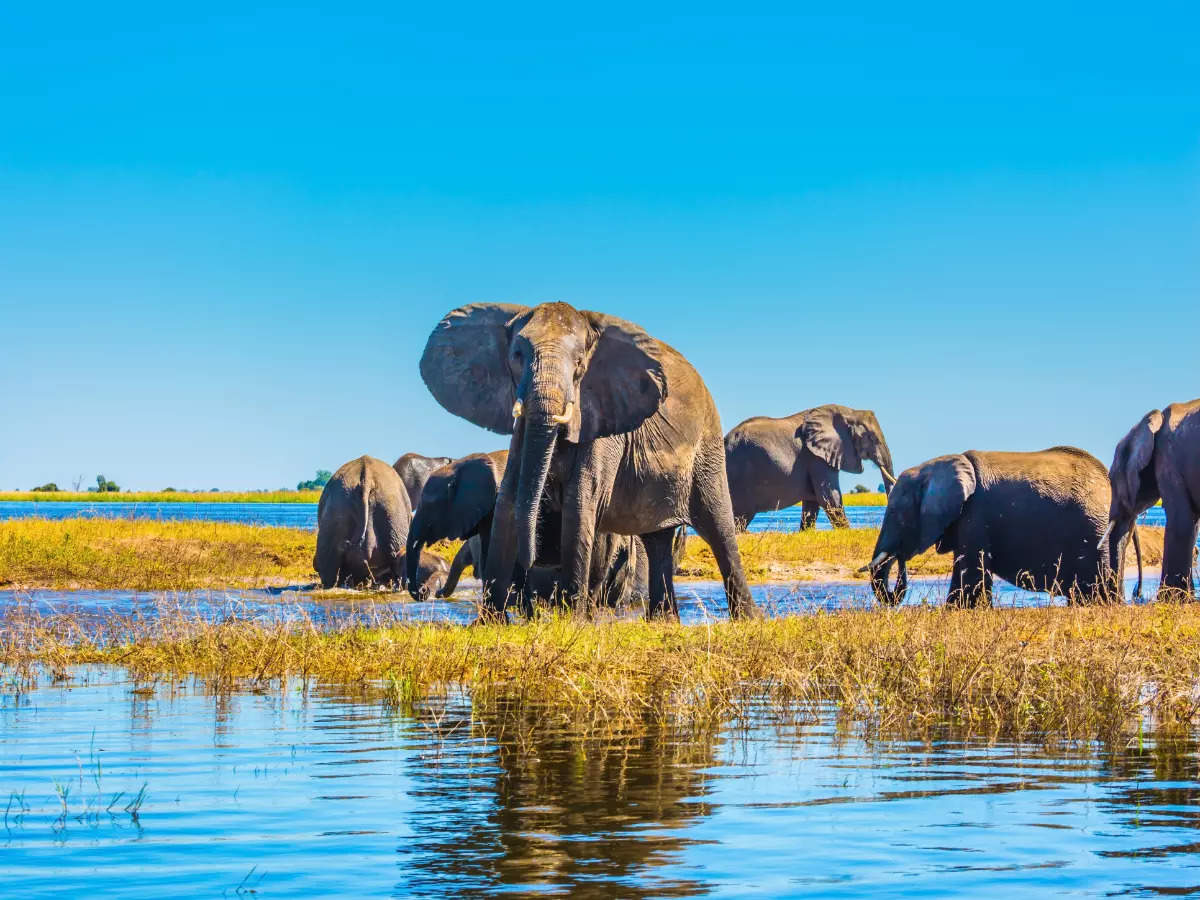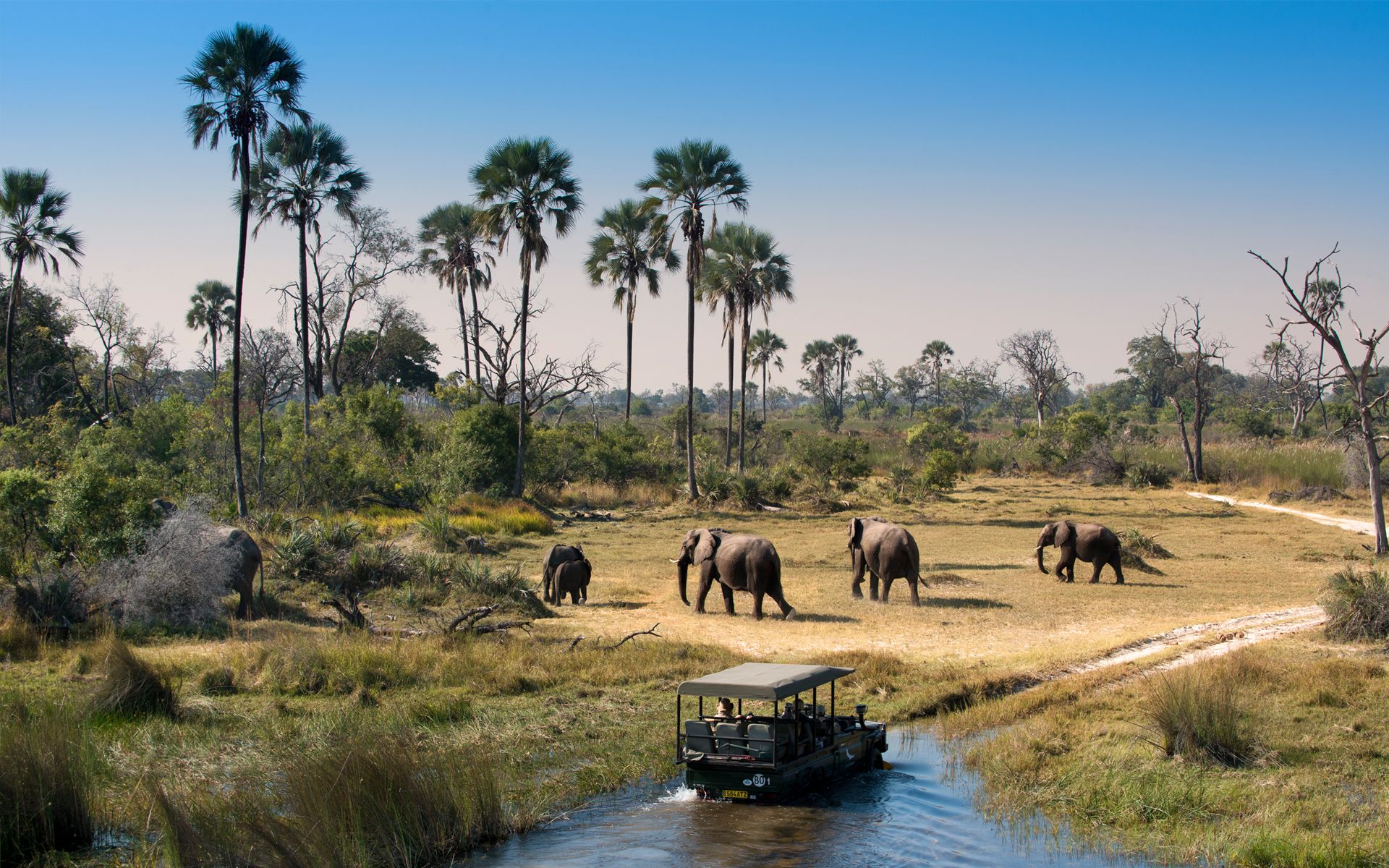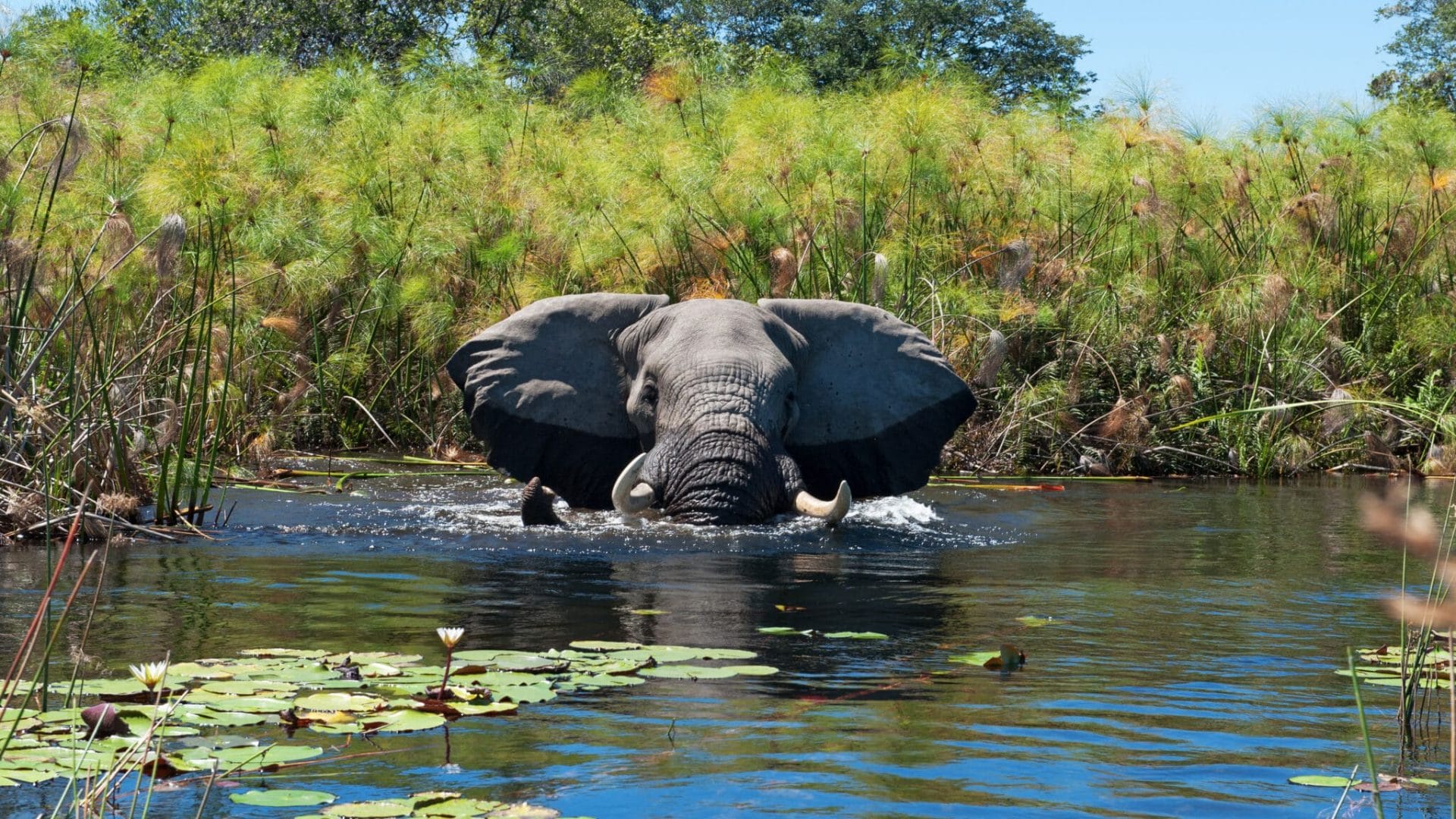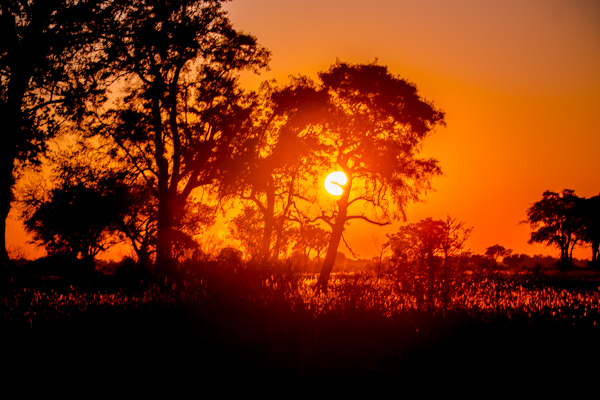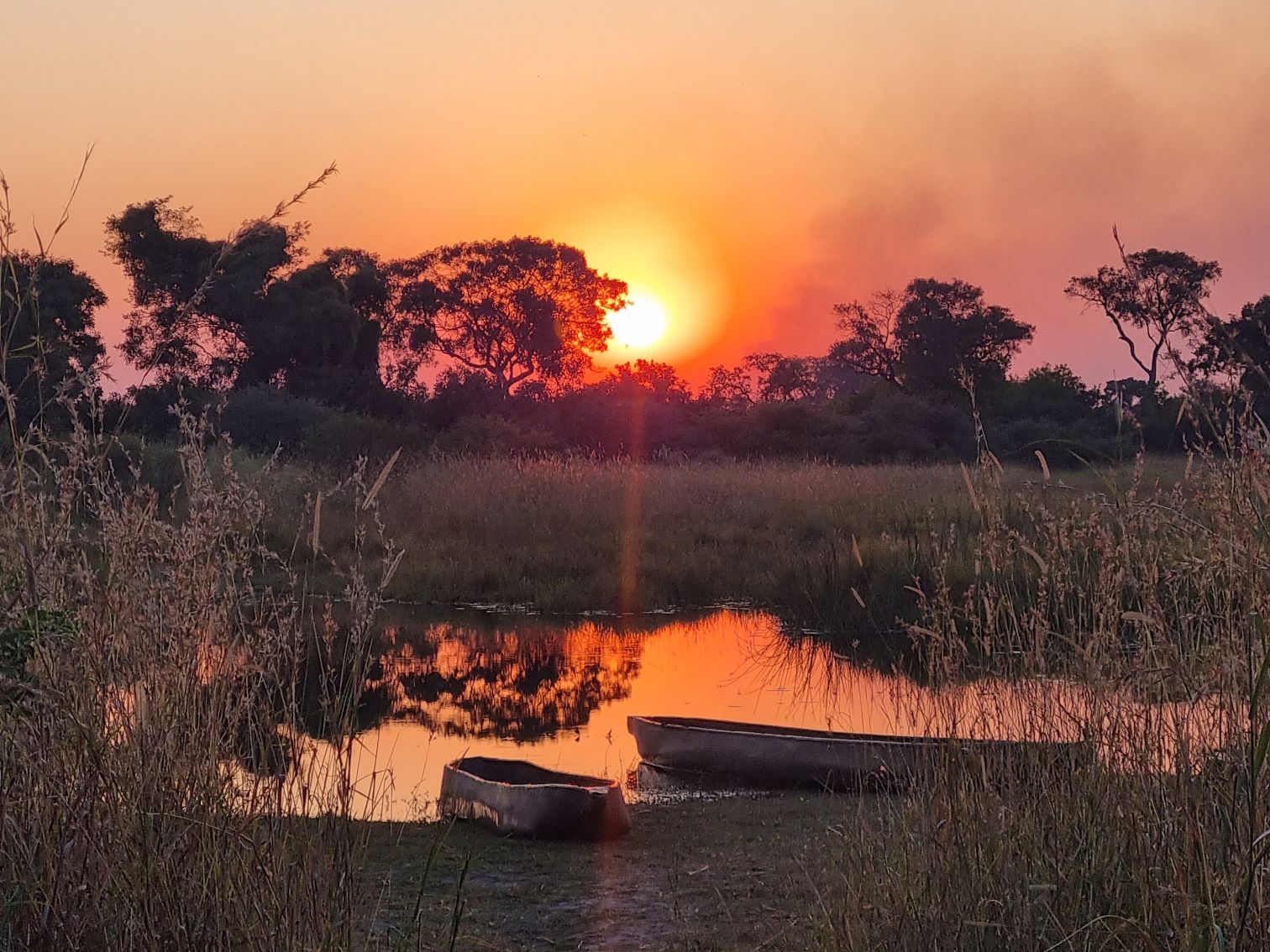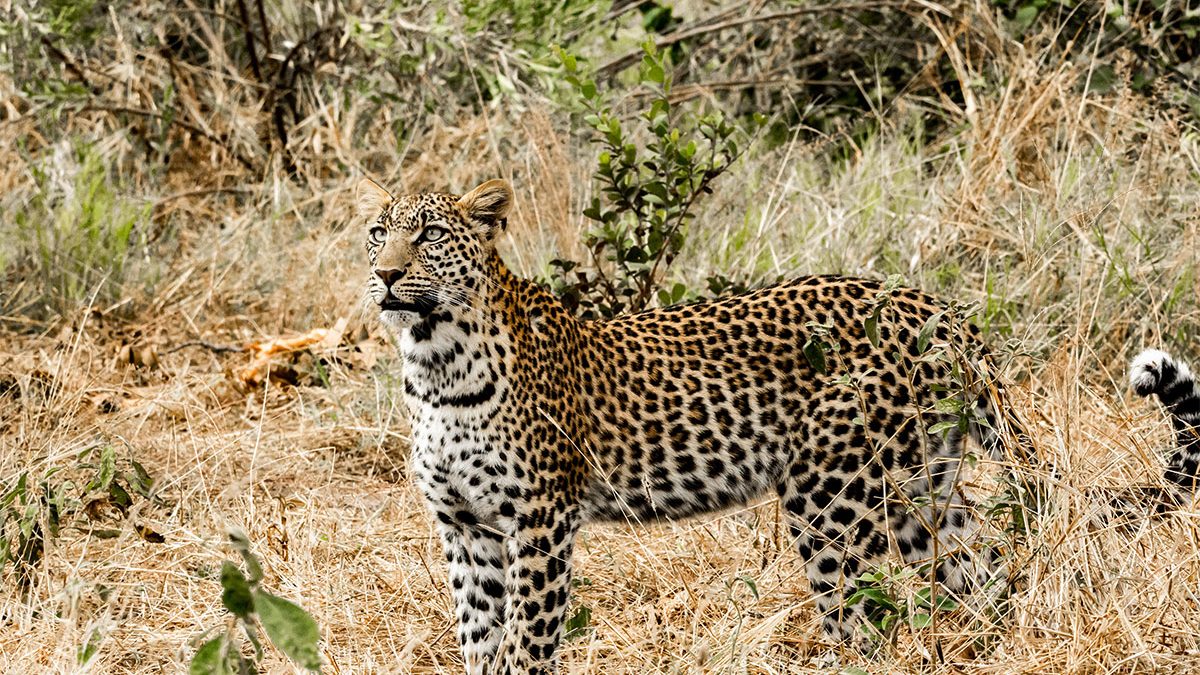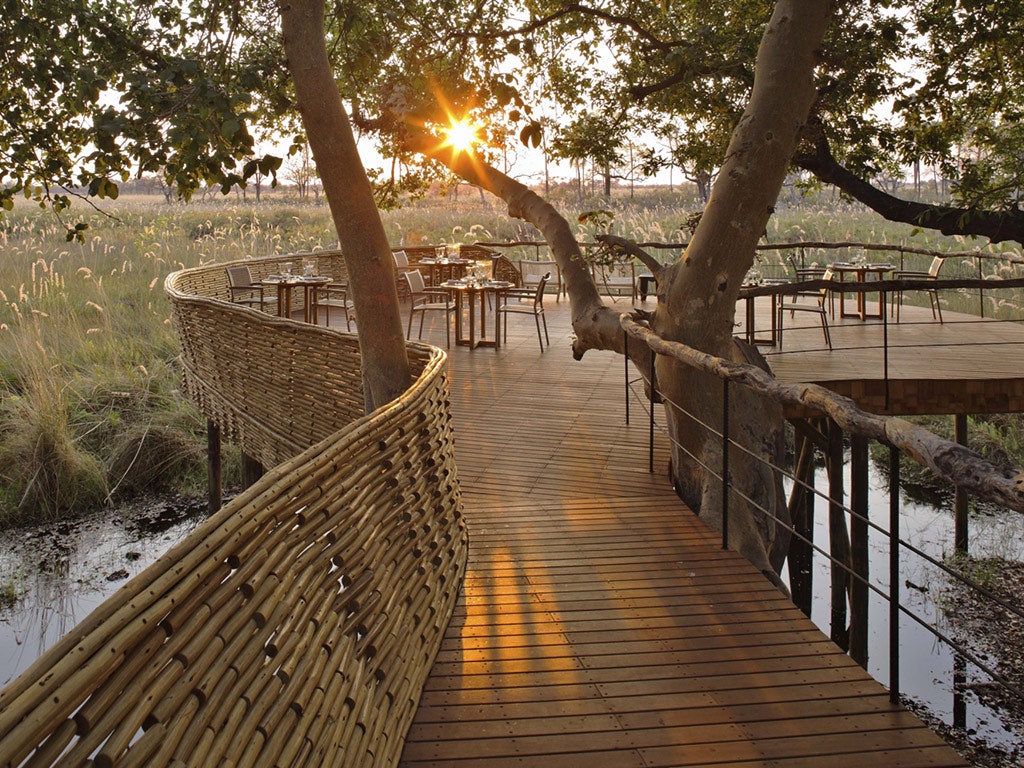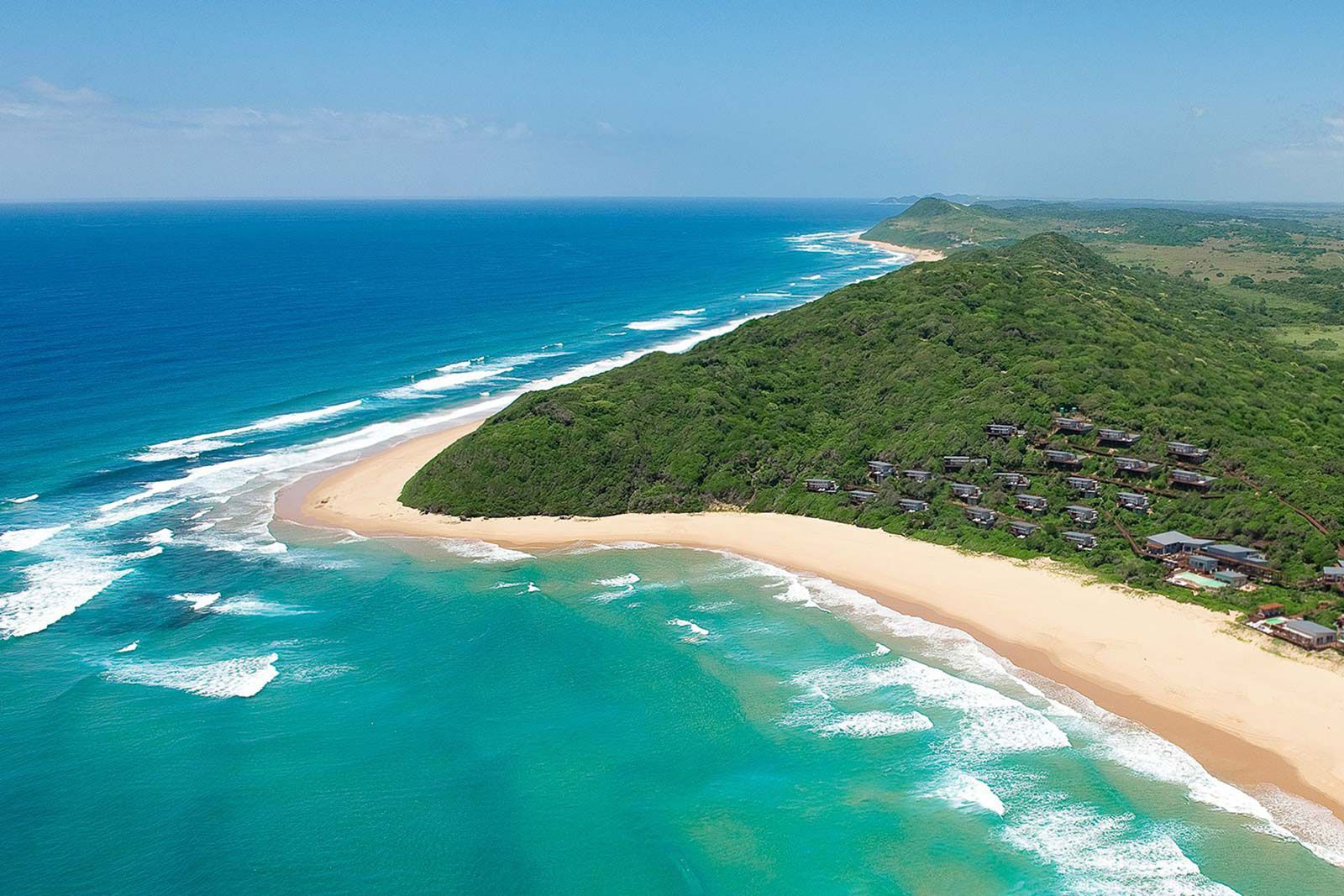Views Of Okavango Delta
About
location:
Central Kalahari basin, Botswana
The Okavango Delta is a vast inland river delta in northern Botswana. It is formed where the Okavango River flows into the Kalahari Desert, creating a unique ecosystem of marshes, channels, lagoons, and islands. The delta is fed by seasonal rains in the Angola highlands, which flow more than a thousand kilometers to reach the delta, making it one of the largest inland deltas in the world.
The Okavango Delta is home to a diverse array of wildlife, including elephants, hippos, crocodiles, lions, leopards, and a wide variety of bird species. It is a popular destination for safari-goers and nature enthusiasts, offering opportunities for game drives, mokoro (traditional dugout canoe) excursions, walking safaris, and birdwatching.
The delta is also a UNESCO World Heritage Site, recognized for its ecological importance and exceptional natural beauty. It provides vital water sources for wildlife and local communities, and plays a crucial role in maintaining the region's biodiversity. The Okavango Delta is a must-visit destination for those seeking a unique and unforgettable safari experience in Africa.
Things to know before travelling to Okavango Delta
This article is a tip of the iceberg but will equip you with the "Absolute Need to Knows" for Okavango Delta.
How to get there?
The easiest and most popular way to get to Okavango Delta is by air. You can fly to one of the major cities in Africa such as Johannesburg, Nairobi, or Addis Ababa and then book a connecting flight to Maun, Botswana.
Maun is the main gateway to the Okavango Delta and is well-connected to other parts of Africa. Once you arrive in Maun, you can take a short flight or drive to one of the lodges or camps in the Okavango Delta area. From there, you can arrange for guided safaris, boat rides, and other activities to explore this unique and diverse ecosystem.
About the weather
The Okavango Delta has a subtropical climate, with two main seasons:
Wet Season (November to March) is the hottest and wettest time of year, with temperatures averaging around 30°C (86°F) and heavy rain. The delta fills with water during this time, making it an ideal time for boat safaris and game viewing.
Dry Season (April to October) is the cooler, drier time of year, with temperatures averaging around 25°C (77°F) and little to no rainfall. During the dry season, the Okavango Delta becomes a paradise for wildlife.
As the water levels begin to drop, animals congregate around the remaining water sources, making it an excellent time for game viewing. The dry season is also a great time for birdwatching, as migratory birds flock to the delta in search of food and water.
The dry season also offers an opportunity to explore the delta on foot, as the bush becomes less dense and easier to navigate. This allows visitors to experience the Okavango Delta in a more intimate and immersive way.
Medical matters that affect your visit.
Visiting the Okavango Delta in Botswana, a remote and beautiful natural area, can be a fantastic experience. However, there are several medical matters to consider before your visit to ensure a safe and enjoyable trip. Some of the medical considerations that may affect your visit to the Okavango Delta include:
Vaccinations
It is important to be up-to-date on routine vaccines such as measles, mumps, rubella, diphtheria, tetanus, pertussis, and influenza. Additionally, certain vaccines like yellow fever, hepatitis A and B, and typhoid may be recommended depending on your travel itinerary and activities.
Malaria
The Okavango Delta is located in a malaria-endemic area, so taking antimalarial medication before, during, and after your trip is essential. Consult with a healthcare provider about the appropriate antimalarial medication for your specific needs.
Water Safety
Ingesting contaminated water can lead to water-borne illnesses like diarrhea. It is recommended to drink bottled or treated water and avoid consuming drinks with ice or eating raw or undercooked food.
Sun Exposure
The African sun can be intense, so it is important to protect yourself from sunburn by using sunscreen with a high SPF, wearing protective clothing, and staying hydrated.
Insect Bites
Insect repellent, long-sleeved clothing, and mosquito nets can help prevent mosquito bites that can transmit diseases like malaria and dengue fever.
Traveler's Diarrhea
Changes in diet and exposure to new bacteria can lead to traveler's diarrhea. Pack over-the-counter medications for diarrhea and stay hydrated to avoid dehydration.
First Aid kit
Bring a well-stocked first aid kit with essential items such as bandages, antiseptic wipes, pain relievers, and any prescription medications you may need.
Medical Facilities
Access to medical facilities in remote areas like the Okavango Delta may be limited. Consider purchasing travel insurance that covers medical evacuation in case of emergencies.
Physical Fitness
Depending on the activities you plan to engage in, such as hiking, canoeing, or walking safaris, ensure that you are physically fit and able to participate safely.
Animal Encounters
The Okavango Delta is home to a diverse range of wildlife, including potentially dangerous animals. Follow safety guidelines provided by guides to minimize risks during wildlife encounters.
Always consult with a healthcare provider or travel medicine specialist well in advance of your trip to discuss any specific medical concerns or requirements for your visit to the Okavango Delta.
About the locals
The Okavango Delta is home to the Bayei, the Hambukushu, and the Batawana, who have lived in the region for centuries. These groups are known for their rich cultural traditions, which are closely tied to the delta's natural environment. The Bayei and Hambukushu people speak the Okavango Delta's unique Kavango languages, which are not related to the Bantu languages that are predominant in the region.
The Bayei people have traditionally fished the Okavango Delta using a unique style of fishing called "molapula." This involves wading into the water and driving fish into traps, using a fan-shaped structure called a "murembo."
The Bayei and Hambukushu people have a strong interdependent relationship with the delta. They depend on the delta's water and resources for their livelihoods, while also playing an important role in conserving the delta's natural environment.
Cultural Ettiquettes at Okavango Delta
Here are a few cultural etiquette tips to keep in mind when visiting the Okavango Delta:
When visiting local villages or interacting with the indigenous people, it's important to dress conservatively. Women should wear clothes that cover their shoulders and knees, while men should avoid wearing shorts or singlets.
If you're invited to someone's home, it's polite to bring a small gift, such as some sweets or a small bottle of whiskey. However, avoid giving money as it can be seen as disrespectful. The local people are very friendly and welcoming. It's important to greet them with a warm smile and a friendly handshake, especially if you're meeting someone for the first time. You can also try saying "Dumela," which means "hello" in Setswana.
Always ask permission before taking someone's photo. Some people may not want their photo taken or may request payment. Remember to treat everyone with respect and kindness. The Okavango Delta is a unique and sensitive ecosystem. When visiting the Okavango Delta, it's important to take care of the environment and respect local customs. For example:
- Avoid littering or polluting the water.
- Don't approach or feed the wildlife.
- Stay on designated paths to avoid disturbing the ecosystem.
Remember, the Okavango Delta is a fragile ecosystem and it's up to all visitors to help protect it for future generations to enjoy.
Language and communication at Okavango Delta
The Okavango Delta is a multicultural region, with a variety of languages spoken. The dominant languages in the region are Setswana, Ikalanga, and Hambukushu. While most people speak English, knowing a few words in the local language can go a long way in building relationships with locals.
Most lodges and guides in the Okavango Delta use sign language when communicating with each other and guests during game drives. This helps to maintain a quiet environment, which is important for observing wildlife without disturbing them.
If you're lucky enough to go on a birdwatching tour in the Okavango Delta, you may notice that your guide communicates with other guides using bird calls. Each guide has a unique bird call that identifies them, and they use this to let others know about the location of specific birds or animals.
If you're interested in learning more about the local languages and cultures, consider participating in a cultural village tour or home stay. The Okavango Delta is a place where nature, wildlife, and local cultures all intersect in unique and beautiful ways.
Vital Information on Money Matters
When it comes to money matters in the Okavango Delta, the local currency is the Botswana Pula (BWP), but many lodges and tour operators also accept payment in US Dollars and Euros. It's a good idea to have a mix of local currency and foreign currency with you during your trip.
Most high-end lodges accept credit cards (Visa and Mastercard are most commonly accepted), but it's always a good idea to carry some cash as well. There are very few ATMs in the Okavango Delta, so it's important to withdraw enough cash before you arrive. Maun, the gateway town to the Okavango Delta, is the best place to find ATMs.
Tipping is not obligatory, but is appreciated in Botswana. A 10-15% tip for guides and waitstaff is the norm. If you're unsure, ask your tour operator or lodge for guidance.
Many lodges have established community trusts that fund local initiatives. These community trusts often welcome donations, and some lodges even have donation boxes where guests can make contributions. This is a great way to support the local communities that play a crucial role in maintaining the Okavango Delta's natural beauty and wildlife.
Overall, managing your money in the Okavango Delta requires a bit of planning, but can be easily done with a little preparation. Just remember to be mindful of the local customs and practices, and don't be afraid to ask for guidance if you're unsure.
Fun things to do at Okavango Delta
Here are some fun things to do at Okavango Delta, Botswana:
Mokoro Excursions
One of the most popular activities in the Okavango Delta is taking a mokoro (dugout canoe) excursion. You can glide through the tranquil waters of the delta, spotting wildlife and enjoying the peaceful surroundings.
Walking Safaris
Guided walking safaris in the Okavango Delta offer a unique opportunity to explore the area on foot and get up close to the flora and fauna. Walking safaris allow you to learn about the ecosystem in more detail and experience the sights, sounds, and smells of the bush.
Game Drives
Game drives in open 4x4 vehicles are a great way to spot the diverse wildlife of the Okavango Delta. You can see animals such as elephants, lions, leopards, and various antelope species in their natural habitat.
Bird Watching
The Okavango Delta is a paradise for bird watchers, with over 400 species of birds inhabiting the area. You can spot colorful birds such as kingfishers, herons, eagles, and many more while exploring the delta.
Cultural Visits
Visiting local communities and learning about the traditional lifestyle of the people living in and around the Okavango Delta can be a rewarding experience. You can interact with the locals, participate in cultural activities, and gain insight into their way of life.
Sundowner Cruises
Enjoy a relaxing boat cruise on the delta at sunset while sipping on a refreshing drink. Watching the sun go down over the water while surrounded by the sounds of nature is a magical experience.
Fishing
The Okavango Delta offers fantastic fishing opportunities, with a wide variety of fish species available. You can try your hand at catching tigerfish, tilapia, and catfish while enjoying the serene surroundings of the delta.
Hot Air Balloon Safaris
For a truly unforgettable experience, consider taking a hot air balloon safari over the delta. Enjoy panoramic views of the landscape from above and spot wildlife from a bird's eye view.
These are just a few of the fun things to do at the Okavango Delta. Whether you're interested in wildlife viewing, water activities, cultural experiences, or simply taking in the natural beauty of the area, the delta has something for everyone.
Who can travel to Okavango Delta?
The Okavango Delta is open to all travelers, regardless of nationality or age but there are some things to consider before traveling.
First, the Okavango Delta is located in a remote area of Botswana, so you'll need to plan your trip well in advance to ensure you have the necessary permits, transportation, and accommodations.
Second, traveling to the Okavango Delta can be expensive, especially if you're staying in luxury lodges and taking part in activities such as game drives and helicopter rides. However, there are also budget-friendly options, such as camping or staying in self-catering accommodations.
Third, some activities in the Okavango Delta, such as mokoro (traditional canoe) rides or long game drives, can require a certain level of physical fitness. If you have any health concerns or physical limitations, it's important to discuss these with your tour operator or < contact us> before booking your trip.
In summary, the Okavango Delta is an amazing destination that is open to travelers of all types. Just be sure to do your research, plan ahead, and be mindful of your budget and physical abilities.
Travel Documents
You will need a valid passport and visa to enter Botswana. Make sure your passport is valid for at least six months after your travel date and check if you need to obtain a visa before traveling.
What time of the year is best to visit?
The best time to visit the Okavango Delta depends on what you want to see and do during your trip, but generally, the most popular seasons are:
During the dry season (May to October), the water levels in the Delta are at their lowest, making it easier to see wildlife congregating around water sources. This is also when the weather is cooler and drier, making for more comfortable safari conditions.
The flood season (December to March), fills the Delta with water from the Angolan highlands, creating a unique and spectacular landscape. The wildlife disperses more widely, but the birdlife is abundant, and the waterways are teeming with hippos, crocodiles, and other aquatic creatures.
The shoulder seasons (April and November)offer a mix of the best of both worlds, with fewer crowds and a diversity of wildlife and vegetation. This can be an ideal time to visit if you want to avoid the heat of the dry season and the peak crowds.
There are also several annual events that occur in the Okavango Delta, such as the Okavango Delta Bush Festival, which takes place in June and celebrates the local culture and traditions of the region. If you're interested in attending events like this, it's worth planning your trip around them.
In short, the best time to visit the Okavango Delta will depend on your preferences and priorities. Whether you prefer dry, hot weather with abundant wildlife or lush, wet scenery with abundant birdlife, there's a season that will suit your needs.
Packing essentials for your trip
Packing essentials for a trip to the Okavango Delta in Botswana may include:
- Lightweight and breathable clothing for hot weather.
- Sturdy, comfortable walking shoes or hiking boots for exploring the area.
- Sandals or water shoes for water activities like mokoro rides or boat trips.
- Wide-brimmed hat to protect against the sun.
- Sunglasses with UV protection to shield your eyes.
- High SPF sunscreen to prevent sunburn.
- Insect repellent to protect against mosquitoes and other bugs.
- A reusable water bottle to stay hydrated throughout the day.
- Binoculars for wildlife viewing and birdwatching in the delta.
- Camera to capture the stunning landscapes and wildlife.
- Binoculars for better views of distant animals and birds.
- Any personal medications you may need during your trip.
- First-aid kit with essentials like bandages, antiseptic cream, and pain relief.
- Passport, visa (if required), travel insurance documents, and any other necessary paperwork.
- Sufficient cash in local currency for tips, souvenirs, and other expenses.
- Credit/debit cards for larger purchases and emergencies.
- Travel adaptor to charge your electronic devices.
- Portable charger to keep your devices powered while on the go.
- Waterproof bag or pouch to protect your electronics, documents, and other valuables from water damage during water activities.
Remember to pack light and smart for your trip to the Okavango Delta to ensure a comfortable and enjoyable experience exploring this unique and beautiful destination.
view map
Book Flight ticket
If this widget is not showing try reloading the page
The flight search result will be provided in a new tab
Maun international airport will be a good destination if you are coming from outside Botswana
Book Hotel
If this widget is not showing try reloading the page
The hotel search result will be provided in a new tab
Input Maun, Botswana as the city name to search and compare hotel prices
You can book tours at hotels upon arrival.
